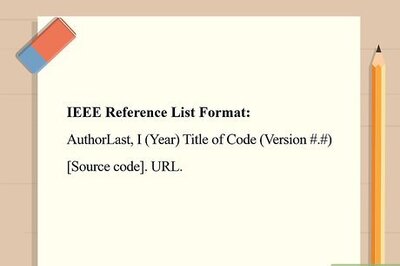
views
Achieve financial reliance, develop market interface by offering training in open market, build content with the “language preference of the learners of all cohorts, Indian ethos, culture and principles of diversity and inclusivity”, the government has told Civil Service Training Institutions (CSTIs) in fresh Karmayogi guidelines for 2023.
Karmayogi is the title of the Narendra Modi government’s special project for training and capacity building projects for the IAS, IFS, IPS and other civil service officers. Apart from the civil service officer, the organisation and the online platform impart training for government employees working at any level and provide online study material.
A year before 2024 General Elections, the fresh 15-page guidelines for the civil service training and the training institutes reflect Modi government’s idea of reforms that primarily banks on self-reliance and least dependence on the government or related departments for funding, said the senior IAS officers who are part of the mission.
Build Market Interface, Be Self-Reliant
In the guidelines, the government has asked CSTIs to build its market interface to impart training to private entities, along with the central and state government officers. The guidelines also talk about market-competitive training content.
“Develop market interface, where ministries, departments, organisations (MDOs) deem appropriate, by offering training programmes and courses to Civil Servants across the Government of India and State Governments as well as other entities in the open market,” said the guidelines.
“Thus, the CSTIs shall strive to become competitive in terms of producing quality course content for classroom/online delivery and achieve financial self-reliance. Governance structure of lead CSTIs is key to enabling CSTIs to develop high quality market competitive training content and pedagogy.”
According to the guidelines, CSTIs may also consider the recommendations of Capacity Building Commission (CBC), such as the model followed by some CSTIs for self-reliance through retention of the course fees of their training programmes and its utilization for faculty training.
Become ‘Think Tanks’
The government has also asked the institutions to prepare their own capacity building roadmap for continuously improving their institutional quality and capacity – both physical as well as training infrastructure, in alignment with standards and guidelines by CBC.
Strive to develop Centre(s) of Excellence (CoE) in niche domain specialized areas to become think tanks for policy formulation, implementation and monitoring with ability to provide on demand research and consultancy services to ministries and departments, it said. These CoEs are to be identified and certified in consultation with the CBC and shall be required to achieve at least 4-star rating as per NSCSTI standards. The COEs shall endeavour to serve the larger training and capacity building ecosystem, added the guidelines.
Foreign Collaborations
The government has additionally asked the institutions to develop training collaborations independently or through CSTIs preferably on reciprocal basis with global and domestic partners for both onsite and online delivery of courses and modules, sharing of learning resources and best practices.
These training interventions may be short-term and long-term, in specialized domain and functional areas, to address the competencies identified under the ACBPs. Such collaborations may also include study tours, team building exercises, exposure visits and training on projects and programmes, added the guidelines.


















Comments
0 comment